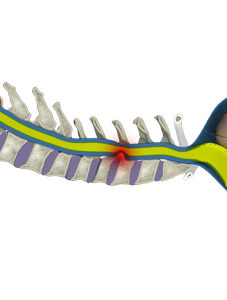
You may be a candidate for Cervical disc replacement
Myelopathy
The spine, often referred to as the “backbone,” is a complex system of bones, joints, ligaments, and muscles. It supports the upper body, facilitates movement, and houses the spinal cord, which transmits information between the brain and peripheral nervous system. Damage to the spinal cord can lead to severe disability, paralysis, or life-threatening complications. Motor function, sensory abilities, and overall health can decline or disappear if the spinal cord becomes damaged.
The term “myelopathy” refers to the loss of spinal cord activity due to injury or the natural degeneration of the spine. Early treatment is crucial to maintain quality of life and prevent further deterioration. If you suspect you or a loved one may have myelopathy, schedule a consultation with one of our highly experienced spine surgeons today.
Causes
The spinal cord is most commonly endangered by degenerative changes such as spinal stenosis, disc protrusions, or herniations. As we age, spines lose water content and the wear and tear of daily use causes further damage. Common causes of myelopathy include:
- Benign or cancerous tumors that compress the spinal cord
- Bone spurs
- A dislocation fracture
- A traumatic injury (e.g., motor vehicle accidents, falls, or high-impact sports)
- Autoimmune diseases like multiple sclerosis
- Genetic predisposition or congenital abnormalities
Annular Tear Symptoms
Patients may not realize they have an annular tear until symptoms of related conditions, like a herniated disc or compressed nerve, appear. If you suspect you may have an annular tear, look out for the following signs:
- Back and leg pain (ranging from mild to severe)
- Pain traveling the length of a nerve
- Worsening pain when sitting, sneezing, coughing, lifting, or bending forward
- Numbness or weakness in the affected area and limbs
- Tingling or pins-and-needles sensations in the back, groin, legs, or arms
Risk Factors
Certain factors can increase your risk of developing myelopathy:
- Smoking
- Age (elderly individuals are especially at risk)
- Alcohol abuse
- Excess weight or obesity
- Participation in intense sports or physical activities (e.g., gymnastics or football)
- Lack of exercise
- Repetitive, strenuous movements (common in physically demanding jobs)
- Improper lifting techniques
If you’re concerned about myelopathy, schedule a consultation with one of our spine experts to minimize risk and maintain spinal cord health. Proper care of your spinal cord is essential to your well-being.
Symptoms
The symptoms of myelopathy vary based on the location and severity of spinal cord issues. Common signs include:
- Pain in the shoulders and arms
- Tingling, numbness, or “pins-and-needles” sensations in the arms and legs
- Difficulty balancing, especially while walking
- Heavy feeling in the legs with limited movement
- Muscle weakness
- Difficulty writing
- Problems turning or bending the neck or back
- Lightheadedness
- Poor hand-eye coordination, affecting daily tasks
- Spasmodic movements
- Sexual dysfunction
- Bowel or bladder issues
- Fatigue or frailty in limbs
- Feeling of electrical shocks in limbs
Symptoms of myelopathy may worsen over time. Prompt medical attention is essential to avoid irreversible damage to the spinal cord. At Microspine, Dr. T and his team are dedicated to identifying the underlying causes and providing optimal care.
Our Minimally Invasive Treatment Approach
Myelopathy can be alarming, but with proper care, satisfactory results are possible. Dr. T and the team at Microspine regularly help patients with spinal cord-related issues. During your consultation, our surgeon will evaluate your symptoms, medical history, and physical state. Diagnostic tests, like a CT scan or X-ray, may be necessary to confirm the diagnosis. Once the nature of your condition is determined, a personalized treatment plan will be developed.
If nerve compression is causing spinal cord damage, surgery may be required. Minimally invasive procedures offer several advantages over traditional open surgeries:
- Shorter recovery times, allowing a quicker return to daily activities
- Less post-operative pain
- Reduced risk of scarring, blood loss, and trauma to surrounding tissues
- Fewer potential complications
Dr. T is skilled in both minimally invasive and traditional surgeries, ensuring the best approach for your unique case of myelopathy.
We look forward to helping you recover quickly and effectively. Contact us today to schedule your consultation.
